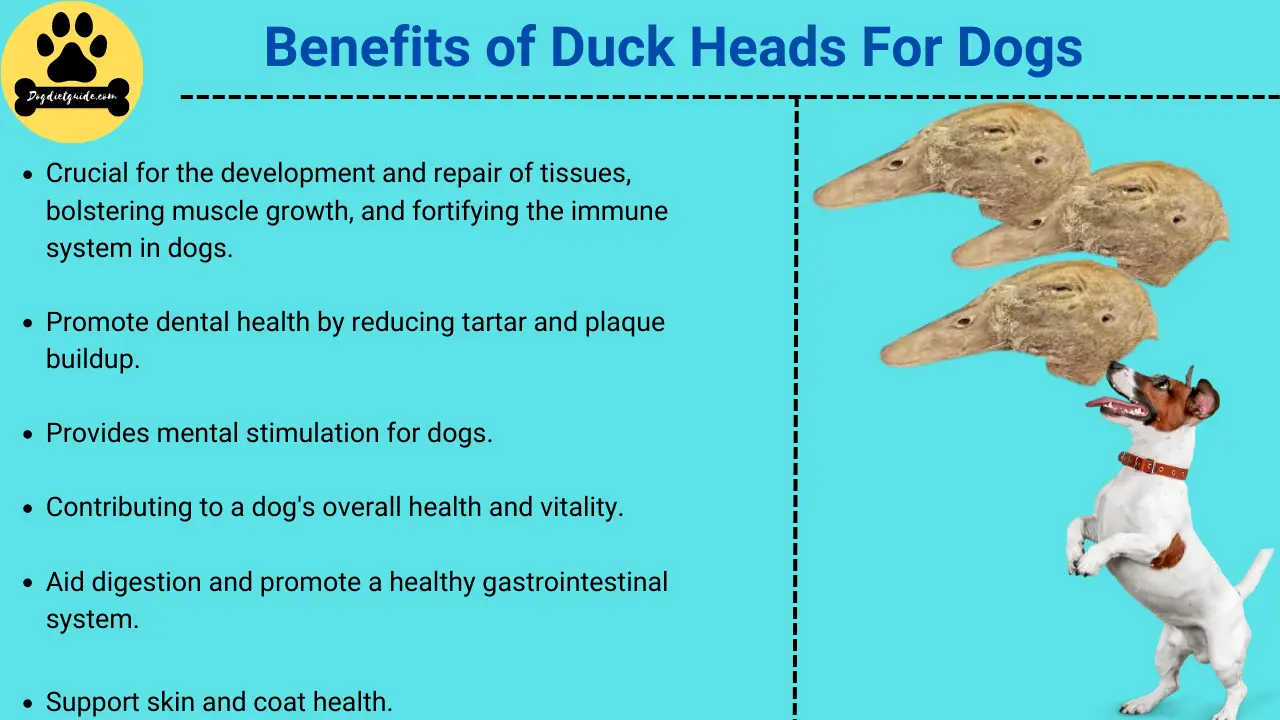In pet nutrition, it’s no surprise that dog owners are constantly seeking new and healthy treat options for their furry companions. One intriguing question that has emerged is can dogs eat freeze dried duck heads? These unconventional treats have gained attention for their potential health benefits and unique appeal. can dogs eat freeze dried duck heads?
Yes, when incorporated into your dog’s diet in moderation, freeze-dried duck heads can be a valuable boost of proteins, omega-3 fatty acids, and essential vitamins. It’s important to note, though, that due to their elevated fat content, it is recommended to include these duck heads as a supplemental dietary component rather than a consistent staple.
Nutritional Value of Freeze-Dried Duck Heads
Like other freeze-dried treats, freeze-dried duck heads are known for their concentrated nutritional content. These treats are often a rich source of protein, a vital macronutrient for canines.
Protein supports muscle development, immune function, and overall vitality.
Also, freeze-dried duck heads may contain essential amino acids contributing to your dog’s overall health.
Can Dogs Eat Freeze-Dried Duck Heads?
Yes, dogs can eat duck heads. Canine nutritionists regard duck heads as an optimal protein source packed with essential nutrients for dogs. Freeze-dried duck heads comprise 75% bone and 25% muscle meat and abundant omega-3 fatty acids and essential minerals like iron, zinc, and phosphorus.
These elements synergistically enhance a dog’s overall health and vitality.
Benefits of Duck Heads For Dogs
Freeze-dried duck heads for dogs offer several benefits to their overall health and well-being.
Here are some of the advantages:
- Duck heads are a protein-rich source, crucial for the development and repair of tissues, bolstering muscle growth, and fortifying the immune system in dogs.
- The texture and shape of freeze dried duck heads can help Puppies promote dental health by reducing tartar and plaque buildup, thereby supporting healthy gums and teeth.
- Provides mental stimulation for dogs, helping to alleviate boredom and potentially reducing destructive behaviors.
- Are duck heads safe for dogs? Duck heads Contain essential nutrients such as vitamins (A, B, and D) and minerals (iron, zinc, and phosphorus), contributing to a dog’s overall health and vitality.
- The natural cartilage found in duck heads can support joint health and mobility, particularly beneficial for older dogs or those prone to joint issues.
- The natural fiber content can aid digestion and promote a healthy gastrointestinal system.
- Being a novel protein source, dehydrated duck heads are an ideal treat choice for dogs with food allergies or sensitivities to frequently encountered proteins such as chicken or beef.
- Contain healthy fats that support skin and coat health, helping to maintain a shiny and lustrous coat.
- Chondroitin in duck heads can help support joint health and may benefit dogs prone to arthritis or joint discomfort.

Potential Risks & Precautions
While freeze dried duck heads offer numerous benefits to dogs, it’s important to be aware of potential risks:
- There may be a choking risk. May contain small bone fragments that could pose a choking or digestive hazard. Option for properly processed treats free from sharp or splintered bones.
- Freeze dried duck necks should be given in moderation, accounting for your furry friend overall caloric intake to prevent weight gain.
- Some dogs may have allergic to the treat. Do not feed to allergic puppies.
Introducing Freeze-Dried Duck Heads
Before incorporating new treats into your dog’s dietary routine, it’s advisable to consult your veterinarian to ensure they are in harmony with your dog’s nutritional requirements.
Option for dehydrated duck heads from reputable brands prioritizing safety and quality.
Begin by offering a small portion to gauge your pet’s reaction. Monitor for any signs of allergies, sensitivities, or digestive issues.
Watch how your puppy responds to the treats. If there are no adverse reactions, you can consider incorporating them into your dog’s treat rotation.
Which Dogs Should Not Eat Freeze-Dried Duck Heads?
Canines with particular dietary restrictions or health conditions should avoid consuming freeze-dried duck necks, heads or other food that could potentially jeopardize their well-being.
Here are some categories of dogs that should avoid consuming duck heads:
- Dogs with Allergies
- Dogs with Dental Problems
- Dogs with Digestive Sensitivity
- Dogs with Pancreatitis
- Small Breeds or Puppies
- Medical Conditions
- Obese Dogs or Those on a Diet
If a pet is known to be allergic to duck or poultry products, it’s important to avoid feeding them dehydrated duck heads for dogs to prevent allergic reactions.
The treats can be quite hard and may not be suitable for dogs with dental issues, such as broken teeth, gum disease, or missing teeth. These dogs may struggle to chew or might experience discomfort while eating such hard treats.
Some canines have sensitive stomachs or digestive systems. Introducing new and unfamiliar foods like freeze-dried duck heads can upset their stomach and lead to digestive issues.
Dogs prone to pancreatitis should avoid high-fat treats, as freeze-dried duck heads may contain a significant amount of fat.
For very small breeds or young puppies, duck heads may be too large, pose a choking hazard, or be difficult to consume.
Duck heads can be calorie-dense and may not be appropriate for dogs that need to lose weight or are on a controlled diet.
Dogs with specific medical conditions, such as kidney issues or liver problems, should have their diets closely monitored and approved by a veterinarian.
Always consult with a veterinarian before introducing new treats or foods into your dog’s diet, especially if your dog falls into any of the above categories or if you have any concerns about their health or dietary needs.
Read More:
FAQS
Can dogs eat duck beaks?
Duck beaks are not recommended for dogs to eat. They can be quite hard and potentially pose a choking hazard or cause dental issues for your dog.
Are duck heads safe for dogs?
Duck heads can be safe for dogs to eat in moderation, but it’s important to ensure that they are properly prepared and cooked to avoid any potential risks of choking or bacterial contamination.
Can dogs eat dehydrated duck heads?
Dehydrated duck heads are a popular dog treat and can be a safe option if they are sourced from reputable manufacturers and given in moderation. However, always monitor your dog while they’re eating treats to prevent any potential choking.
What part of the duck is good for dogs?
Lean cuts of cooked duck meat, without bones and skin, can be a good option for canines. It provides protein and can be a tasty treat.
Is duck hard for dogs to digest?
Duck meat is generally easily digestible for most dogs, especially when cooked and prepared properly. However, dogs with sensitive stomachs or specific dietary needs might react differently, so introducing new foods gradually and carefully observing your dog’s response is consistently advisable.
Final Thoughts: Can Dogs Eat Freeze Dried Duck Heads?
In canine cuisine, freeze-dried duck heads emerge as a unique and potentially nutritious treat option for your furry friend.
Packed with protein and a crunchy texture, these treats may contribute to your pet’s overall health and well-being.
However, responsible pet ownership means being aware of potential risks and introducing new treats in moderation.
Following the steps outlined in this guide and consulting with your veterinarian, you can determine whether freeze-dried duck heads are a feathered delight that aligns with your furry friend’s dietary preferences and nutritional needs.

References:
https://www.petmd.com/dog/nutrition/healthy-foods-checklist-duck-dogs




![Can Dogs Eat Blood? 7 Side Effects [Expert Opinion]](https://petskor.com/wp-content/uploads/2022/04/Webp.net-resizeimage-12.jpg)

